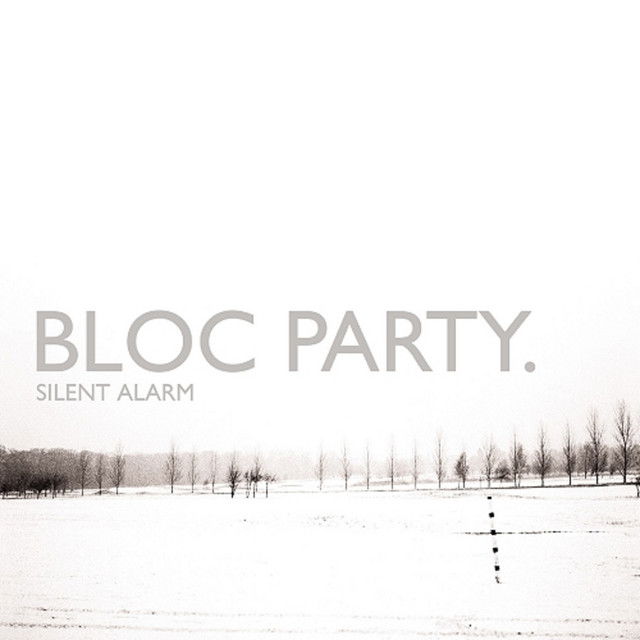Song Stories: Bloc Party: This Modern Love
In 2005, Bloc Party’s debut album 'Silent Alarm' hit the UK indie rock scene like a lightning bolt, urgent, articulate, and undeniably fresh. Amid its angular guitar riffs and frenetic rhythms lies a track that has quietly become one of the band’s most cherished: 'This Modern Love'.
At first glance, 'This Modern Love' appears unassuming. It doesn’t burst open like 'Banquet' or 'Helicopter'. Instead, it unfolds. It begins gently, with Kele Okereke’s voice fragile and hesitant: “To be lost in the forest / To be caught adrift.” The song grows in waves, layer by layer, instrument by instrument swelling into an aching, euphoric crescendo. And even then, it never quite explodes. It trembles. It aches. It sighs.
The brilliance of 'This Modern Love' lies in its restraint. It captures the emotional turbulence of romantic uncertainty not through grand declarations, but through repetition, precision, and tension. Guitars loop and fold over themselves, Matt Tong’s drumming tightens like a coil, and Okereke’s vocals walk the line between intimacy and distance. “Do you want to come over and kill some time?” he asks, a line both casually tossed off and desperately revealing.
The song starts simply: a looping guitar riff, a tentative vocal. “To be lost in the forest, to be caught adrift…” It’s a meditation on miscommunication, longing, and emotional disconnection, subjects rarely explored with such nuance in indie rock. As it builds, layers of guitar rise like restless thoughts, and the rhythm becomes increasingly unsettled, echoing the song’s internal conflict.
By the time Okereke cries out, “This modern love breaks me,” the track has reached a peak of emotional intensity. Yet it never fully bursts. It teeters on the edge. There’s power in that restraint. While bands like Arctic Monkeys roared with sharp-tongued bravado and The Libertines reveled in chaotic romanticism, Bloc Party simmered.
Lyrically, 'This Modern Love' articulates something rarely expressed so plainly: the ambiguity of modern relationships. It’s not a love song in the traditional sense. It’s about uncertainty. About emotional distance. About the paradox of constant communication and lingering isolation.
“You told me you wanted to eat up my sadness / Well jump on, enjoy, you can gorge away” the words feel absurdly intimate, yet tinged with detachment. There’s no melodramatic climax, no sweeping declarations. Just confusion, subtlety, and emotional restraint. The title itself, 'This Modern Love', carries a trace of irony suggesting that whatever love means today, it’s anything but straightforward.
In an album full of urgency and friction, 'This Modern Love' is the slow, swelling bruise. It doesn’t thrash it aches. And in that ache, it speaks more loudly than any anthem.

What makes 'Silent Alarm' so compelling is its balance of consistency and range. It opens with 'Like Eating Glass', a fractured, disorienting take on relationship breakdown, driven by jittery rhythms and jagged guitars. 'Helicopter' became an early calling card, fast, furious, and politically sharp. 'Banquet', with its chopped-up riffs and falsetto hooks, bridged dancefloor energy with indie rock attitude.
Then there’s 'Blue Light', a tender, almost ambient ballad that hinted at a quieter emotional depth. 'She’s Hearing Voices', with its taut rhythms and paranoid lyricism, veered into art-punk territory and showcased the band’s experimental side.
Bloc Party emerged during the height of the UK’s so-called “landfill indie” boom a time when guitar bands crowded the charts and festivals. The Libertines brought messy romanticism. Kaiser Chiefs gave us football-chant choruses. Kasabian leaned into electronic swagger and psychedelia. Arctic Monkeys offered razor-sharp portraits of nightlife and Northern youth.
Bloc Party never quite fit that mold. Their influences were more eclectic: Gang of Four, Sonic Youth, The Cure, electronic music, even classical composition. Kele Okereke’s voice stood out not just sonically, with its delicate vibrato and poetic cadence, but culturally. As a Black, queer frontman in a predominantly white, male, and often laddish scene, his presence was radical. But more than that, Bloc Party’s songs weren’t about being the loudest in the room they were about the loneliness in a crowded one.
Nearly two decades later, 'Silent Alarm' still resonates. It doesn’t feel dated or stuck in its era. Its themes alienation, emotional confusion, political unease remain sharply relevant. Sonically, it continues to feel fresh. And its emotional core paved the way for a generation of artists fusing indie rock with introspection.
If 'Silent Alarm' captured the internal anxieties of modern life, Bloc Party’s 2007 follow-up, 'A Weekend in the City', dove headlong into its external chaos. The band expanded their sound with ambient textures, electronic flourishes, and darker, more aggressive production, matching the weight of its social and political themes.
'Hunting for Witches' took aim at post-9/11 paranoia and media hysteria. 'Where Is Home?' tackled racism and violence against Black Britons with unflinching directness. The album’s opener, 'Song for Clay (Disappear Here)', painted a surreal, disenchanted portrait of London nightlife, nodding to Bret Easton Ellis and trading romance for cynicism.
In an era where volume often equaled value, Bloc Party proved that sometimes, the most devastating truths are whispered. 'This Modern Love' is a testament to that quiet devastation a reminder that vulnerability has a power all its own. 'Silent Alarm' is its beating heart. And while the band would go darker and more expansive on 'A Weekend in the City', the emotional seeds were sown here, in the aching beauty of a modern love.